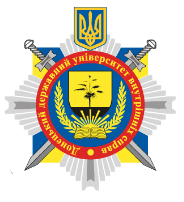LEGAL CONCEPT OF HOSE ORTEGA Y GASET: THE ORIGINAL GENESIS OF LAW
DOI:
https://doi.org/10.32782/2523-4269-2023-83-91-96Keywords:
H. Ortega-y-Gaset, society, custom, coercion, law, public opinion, social law, civil power, youth associations.Abstract
Concepts of law in the philosophical theory of Hose Ortega y Gaseta are studied – the original genesis of law and their essence. In Ortega’s philosophy, law and its genesis emerge from social dynamics, from the real state of collective worldview institutions and ideas of a certain historical era. In other words, the Iberian in his legal visions proceeds from the absolute priority of the socio-historical landscape over the legal-state sphere. Therefore, the nature of law has an objective-historical, cultural essence, and subjective concepts of law and their state implementation are a secondary social phenomenon. Law is part of the constitutive factors of society and originally existed in the circle of custom since archaic times. As a form of human behavior, custom has a mechanized, irrational and soulless nature. It imperatively demands its implementation from the individual, since the norm of custom is the coercion of the entire society, the entire living environment. Thus, custom is a form of social power, which, based on an ancient tradition, determines the rights and obligations of a member of the community, regardless of his will. In traditionalist communities, custom determines all possible horizons of a person’s life, his axiological aspirations. However, the homogeneity of the traditionalist society was disturbed by historical development, which separated age-old corporations and talented individuals from the single social body. They became the first elite who deliberately developed unique perceptions of life and thereby opened a revolutionary era – an era of rational transformation of ordinary society. The revolutionary era is determined by the process of changing custom, separating from it the norms of law, and then social law. The Ortega resident sees this process as follows. First, the existing elite discovers new ideas and meanings and on their basis certain rights are declared (for the existence of a corporation of equal young warriors, the right to war and booty, to exogamous marriage, to private property, the right of the head of a military corporation to power, etc.). Second, the dissemination of new ideas in society by an authoritative group of people (capable of creating a mechanism of coercion separate from the community). Third, innovative ideas become known and become public opinion, transforming custom into law. They, in turn, segregate society and its traditionalist customs, turning them into a social law – a verbal voluntary order that defines certain spheres of life and forms a concept of power alienated from society. Social laws emanating from public power, which is controlled by the elite, are used not only to regulate social processes, but become the basis for the formation of state institutions and its laws.
References
Tejada de Elías, Francisco. El concepto del derecho de José Ortega y Gasset. Anuario de filosofía del derecho. 1966. № 12. P. 37–52. URL: https://dialnet.unirioja.es/ejemplar/139379 (Асcessed 8.02.2023)
Alonso Fernando H. Llano. El Derecho y la idea de Estado en José Ortega y Gasset: su proyeccion en la doctrina iusfisofica contemporanea. Derechos y libertades. 2010. Número 22, Época II, enero. Р. 85–117. URL: https://e-archivo.uc3m.es/handle/10016/14566 (Асcessed 8.02.2023).
Luis Felipe Vivares Porras, Perspectivismo y derecho: Articulación del concepto orteguiano de verdad con las formas cognoscitivas de la experiencia jurídica actual. Medellín : UPB, 2017. 164 p. URL: https://repository.upb.edu.co/handle/20.500.11912/3662 (Асcessed 8.02.2023).
Ортега-і-Гасет Х. Безхребетна Іспанія. Вибранні твори. Київ : Основи, 1994. С. 140–195.
Val Jose Maria Martinez. Ortiga y Gasset y el derecho. Conferencia pronunciada en la Real Academia de Jurisprudencia de Madrid, el 20 de enero de 1983. Con ella se ha abierto el 1 Centenario de Ortega y Gasset. Autorizada la publicación en Estudios de Derecho. № 104. P. 48–69. URL: https://doi.org/ 10.17533/udea.esde.332637 (Асcessed 8.02. 2023).
Ortega у Gasset J. El hombre y la gente. Obras completas. T. VII (1948–1958). Revista de Occidente Madrid, 1964. P. 71–272.
Ortega у Gasset J. La rebelion be la masas. Prologo para franceses. Obras completas. T. IV (1929–1933). Revista de Occidente Madrid. 1966. P. 113–142.
Отрега-і-Гасет Х. Спортивне походження держави. Філософська і соціологічна думка. 1990. № 6. С. 36–48.
Ortega у Gasset J. ¿Que es filosofia? Obras completas. T. VII (1948–1958). Revista de Occidente Madrid, 1964. P. 275–438.
Ортега-і-Гасет Х. Занепад революцій. Вибранні твори. Київ : Основи, 1994. С. 370–390.
Ортега-і-Гасет Х. Тема нашої доби. Вибранні твори. Київ : Основи, 1994. С. 315–369.
Ортега-і-Гасет Х. Кант. Вибрані твори. Київ : Основи, 1994. С. 205–226.
Ортега-і-Гасет Х. Епілог про розчаровану душу. Вибрані твори. Київ : Основи, 1994. С. 391–392.
Ортега-і-Гасет Х. Бунт мас. Вибранні твори. Київ : Основи, 1994. С. 15–139.
Ortega у Gasset J. Origen y epilogo de la filosofia. Obras completas. T. IX (1960–1962). Revista de Occidente Madrid. 1965. P. 347–434.





